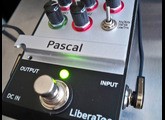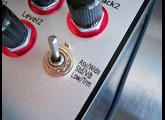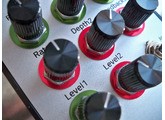« Dual-Channel with Three Phaser Types, Vibe & Tremolo... powerful and sounds fantastic! »
Published on 05/28/23 at 07:53
Best value:
Excellent
Audience:
Anyone
Pascal is a dual-channel (Green & Red) modulation pedal (it also is a module for the LiberaToe pedal/switcher systems). In effect, you have a separate set of controls for each channel. A channel can be turned on or off as usual (fast click via the footswitch), but if you hold the footswitch down for 0.4 seconds, it switches channels (or turns the pedal back on to the next channel). As much as I like the LiberaToe pedals for this reason, Pascal offers a lot of options, as demonstrated in the accompanying video.
The Green channel offers a warm, subtle phaser; a classic phaser (typical of 1970s and 1980s) and an asymmetric phaser (more bite with a higher-end resonant response). The Red channel offers tremolo, vibe, and a wide phaser with a broader phase response. These selections are established via a toggle switch with the following combinations: Toggle Down – Green = warm phaser, and Red = tremolo; Toggle Center – Green = classic phaser, and Red = vibe; and Toggle Up – Green = asymmetric phaser, and Red = wide phaser. Now, if you wanted the warm phaser coupled with the wide phaser, or a different combination between the two channels, you will have to flip the toggle.
As stated, each channel has its own controls, each having Level, Depth, Rate and Feedback. This means a very subtle phaser in one instance (perhaps to add this quality to rhythm), followed by a more robust phaser, e.g., for lead, via both Level and Depth. Moreover, you can have different rates (speed) and feedback (resonance). All of these features should make it obvious how diverse Pascal is and the potential modifications that are possible with very little knob turning, thus providing a gigging musician faster and better flexibility on the go.
This analog true-bypass pedal has exceptional sound quality. The effects are very clear and defined, but also thick and organic. And with the variations of modulations possible, Pascal is an excellent consideration for phaser aficionados. At $147 USD ($85 for the module without the Shell casing), the sound quality and flexibility make this pedal a no-brainer. You do not need to spend a lot of money on ‘boutique’ pedals, when the boutique is available straight from Pascal (and that holds true for any LiberaToe pedal I have reviewed!).
The Green channel offers a warm, subtle phaser; a classic phaser (typical of 1970s and 1980s) and an asymmetric phaser (more bite with a higher-end resonant response). The Red channel offers tremolo, vibe, and a wide phaser with a broader phase response. These selections are established via a toggle switch with the following combinations: Toggle Down – Green = warm phaser, and Red = tremolo; Toggle Center – Green = classic phaser, and Red = vibe; and Toggle Up – Green = asymmetric phaser, and Red = wide phaser. Now, if you wanted the warm phaser coupled with the wide phaser, or a different combination between the two channels, you will have to flip the toggle.
As stated, each channel has its own controls, each having Level, Depth, Rate and Feedback. This means a very subtle phaser in one instance (perhaps to add this quality to rhythm), followed by a more robust phaser, e.g., for lead, via both Level and Depth. Moreover, you can have different rates (speed) and feedback (resonance). All of these features should make it obvious how diverse Pascal is and the potential modifications that are possible with very little knob turning, thus providing a gigging musician faster and better flexibility on the go.
This analog true-bypass pedal has exceptional sound quality. The effects are very clear and defined, but also thick and organic. And with the variations of modulations possible, Pascal is an excellent consideration for phaser aficionados. At $147 USD ($85 for the module without the Shell casing), the sound quality and flexibility make this pedal a no-brainer. You do not need to spend a lot of money on ‘boutique’ pedals, when the boutique is available straight from Pascal (and that holds true for any LiberaToe pedal I have reviewed!).



